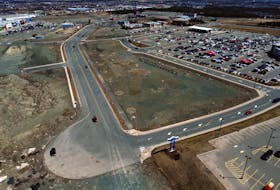It’s been nearly two years since Joan Baxter stepped out her front door on a sunny June morning, only to be overwhelmed by a smell of pollution that made her eyes water and head pound.
That day marked the start of a historical journey through her home province, charting five decades of protest against the mill near Pictou, listening to moving testimonies from those people living in its shadow and sifting through countless documents. These formed the basis of her book ‘The Mill – Fifty Years of Pulp and Protest’.
An experienced journalist who worked in Africa, Baxter uncovered evidence of how corporations co-opt governments, for example having the province grant indemnity to the mill owners in case of effluent pollution in Boat Harbour.
And Baxter had a stark warning for the Friends of Redtail Society audience at Scotsburn’s John P. Gammon Centre on Saturday.
“Canada’s democracy isn’t quite as transparent or accountable as it should be,” said Baxter.
Indeed, after her book was published last November, Northern Pulp launched a letter-writing campaign threatening to boycott Chapters and Coles if they allowed Baxter to host a book signing in New Glasgow.
However, this backfired, making her book a Nova Scotia bestseller through November, December and January.
“It got a lot of publicity that it otherwise wouldn’t have,” recalled Baxter. “It made the national news.”
While Baxter says she repeatedly tried to speak with Northern Pulp and the provincial government, she was unable to do so, but did receive input from the engineer who designed the mill.
As a result, her book became a story of the protest movement against the mill, which started in the 1960s when local fishermen noticed that lobster catches were decreasing.
Since then, the mill has faced opposition from fishermen, First Nations from nearby Pictou Landing, environmentalists, local councilors, tourism operators, doctors and others wanting a cleaner mill.
Baxter described the ongoing protest movement as “wave after wave of citizens coming together.”
Most recently, protests were sparked over Northern Pulp’s proposal to pipe treated wastewater into the Northumberland Strait.
A new waste treatment process is needed to meet a provincial deadline to shut down the Boat Harbour wastewater site by 2020.
Issues concerning the mill are already polarizing people in the surrounding area, according to Baxter.
Nonetheless, she remained hopeful that an environmentally and politically switched-on generation of younger Nova Scotians will help solve the issues associated with that polarization.
“There are so many people in this province trying to make things better,” said Baxter. “I feel like there is an awakening.”









